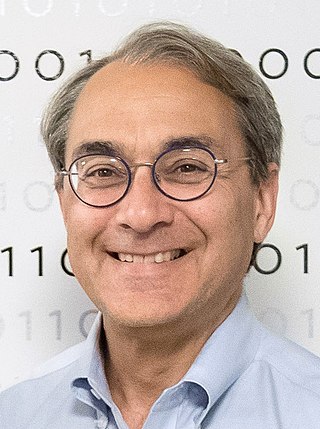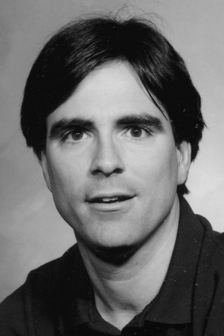Related Research Articles

In computer science, a binary search tree (BST), also called an ordered or sorted binary tree, is a rooted binary tree data structure with the key of each internal node being greater than all the keys in the respective node's left subtree and less than the ones in its right subtree. The time complexity of operations on the binary search tree is linear with respect to the height of the tree.

Carnegie Mellon University (CMU) is a private research university in Pittsburgh, Pennsylvania. The institution was established in 1900 by Andrew Carnegie as the Carnegie Technical Schools. In 1912, it became the Carnegie Institute of Technology and began granting four-year degrees. In 1967, it became Carnegie Mellon University through its merger with the Mellon Institute of Industrial Research, founded in 1913 by Andrew Mellon and Richard B. Mellon and formerly a part of the University of Pittsburgh.

The School of Computer Science (SCS) at Carnegie Mellon University in Pittsburgh, Pennsylvania, US is a school for computer science established in 1988. It has been consistently ranked among the top computer science programs over the decades. As of 2022 U.S. News & World Report ranks the graduate program as tied for second with Stanford University and University of California, Berkeley. It is ranked second in the United States on Computer Science Open Rankings, which combines scores from multiple independent rankings.

Dabbala Rajagopal "Raj" Reddy is an Indian-American computer scientist and a winner of the Turing Award. He is one of the early pioneers of artificial intelligence and has served on the faculty of Stanford and Carnegie Mellon for over 50 years. He was the founding director of the Robotics Institute at Carnegie Mellon University. He was instrumental in helping to create Rajiv Gandhi University of Knowledge Technologies in India, to cater to the educational needs of the low-income, gifted, rural youth. He was the founding chairman of International Institute of Information Technology, Hyderabad. He is the first person of Asian origin to receive the Turing Award, in 1994, known as the Nobel Prize of Computer Science, for his work in the field of artificial intelligence.
Roger Carl Schank was an American artificial intelligence theorist, cognitive psychologist, learning scientist, educational reformer, and entrepreneur. Beginning in the late 1960s, he pioneered conceptual dependency theory and case-based reasoning, both of which challenged cognitivist views of memory and reasoning. He began his career teaching at Yale University and Stanford University. In 1989, Schank was granted $30 million in a ten-year commitment to his research and development by Andersen Consulting, through which he founded the Institute for the Learning Sciences (ILS) at Northwestern University in Chicago.
Hsiang-Tsung Kung is a Taiwanese-born American computer scientist. He is the William H. Gates professor of computer science at Harvard University. His early research in parallel computing produced the systolic array in 1979, which has since become a core computational component of hardware accelerators for artificial intelligence, including Google's Tensor Processing Unit (TPU). Similarly, he proposed optimistic concurrency control in 1981, now a key principle in memory and database transaction systems, including MySQL, Apache CouchDB, Google's App Engine, and Ruby on Rails. He remains an active researcher, with ongoing contributions to computational complexity theory, hardware design, parallel computing, routing, wireless communication, signal processing, and artificial intelligence.

Carnegie Mellon Silicon Valley is a degree-granting branch campus of Carnegie Mellon University located in the heart of Silicon Valley in Mountain View, California. It was established in 2002 at the NASA Ames Research Center in Moffett Field.
Jon Louis Bentley is an American computer scientist who is known for his contributions to computer programming, algorithms and data structure research.
Transarc Corporation was a private Pittsburgh-based software company founded in 1989 by Jeffrey Eppinger, Michael L. Kazar, Alfred Spector, and Dean Thompson of Carnegie Mellon University.

Alfred Zalmon Spector is an American computer scientist and research manager. He is a visiting scholar in the MIT EECS Department and was previously CTO of Two Sigma Investments. Before that, he was Vice President of Research and Special Initiatives at Google.

Randal E. Bryant is an American computer scientist and academic noted for his research on formally verifying digital hardware and software. Bryant has been a faculty member at Carnegie Mellon University since 1984. He served as the Dean of the School of Computer Science (SCS) at Carnegie Mellon from 2004 to 2014. Dr. Bryant retired and became a Founders University Professor Emeritus on June 30, 2020.

The Human–Computer Interaction Institute (HCII) is a department within the School of Computer Science at Carnegie Mellon University (CMU) in Pittsburgh, Pennsylvania. It is considered one of the leading centers of human–computer interaction research, and was named one of the top ten most innovative schools in information technology by Computer World in 2008. For the past three decades, the institute has been the predominant publishing force at leading HCI venues, most notably ACM CHI, where it regularly contributes more than 10% of the papers. Research at the institute aims to understand and create technology that harmonizes with and improves human capabilities by integrating aspects of computer science, design, social science, and learning science.
James Hiram Morris is a professor (emeritus) of Computer Science at Carnegie Mellon. He was previously dean of the Carnegie Mellon School of Computer Science and Dean of Carnegie Mellon Silicon Valley.

Randolph Frederick Pausch was an American educator, a professor of computer science, human–computer interaction, and design at Carnegie Mellon University (CMU) in Pittsburgh, Pennsylvania.

Edmund Melson Clarke, Jr. was an American computer scientist and academic noted for developing model checking, a method for formally verifying hardware and software designs. He was the FORE Systems Professor of Computer Science at Carnegie Mellon University. Clarke, along with E. Allen Emerson and Joseph Sifakis, received the 2007 ACM Turing Award.

Leonard J. "Len" Shustek is a founder of networking companies Nestar Systems and Network General and a former chairman of the board of trustees of the Computer History Museum located in Mountain View, California.
Eric Nyberg is a professor in the Language Technologies Institute of the School of Computer Science at Carnegie Mellon University. He is the director for the Master of Computational Data Science.

Chris Harrison is a British-born, American computer scientist and entrepreneur, working in the fields of human–computer interaction, machine learning and sensor-driven interactive systems. He is a professor at Carnegie Mellon University and director of the Future Interfaces Group within the Human–Computer Interaction Institute. He has previously conducted research at AT&T Labs, Microsoft Research, IBM Research and Disney Research. He is also the CTO and co-founder of Qeexo, a machine learning and interaction technology startup.
Andrew Pavlo, best known as Andy Pavlo, is an associate professor of Computer Science at Carnegie Mellon University. He conducts research on database management systems and is especially interested in "main memory systems, self-driving / autonomous architectures, transaction processing systems, and large-scale data analytics". Pavlo is also a co-founder and CEO of OtterTune, a database startup that provides automatic database tuning services.
References
- 1 2 3 4 5 6 Carnegie Mellon University. "Jeffrey Eppinger - Software and Societal Systems - School of Computer Science". Carnegie Mellon University. Retrieved 2024-04-28.
- ↑ Eppinger, Jeffrey L. (September 1983). "An Empirical Study of Insertion and Deletion in Binary Trees". Communications of the ACM. 26 (9): 663–669. doi: 10.1145/358172.358183 .
- ↑ Donald Knuth - TAOCP Volume 3, pp. 434-5: Sorting and Searching . Second Edition (Reading, Massachusetts: Addison-Wesley, 1998), xiv+780pp.+foldout. ISBN 0-201-89685-0
- ↑ Eppinger, Jeffrey Lee (1989). Virtual memory management for transaction processing systems (PhD thesis). USA: Carnegie Mellon University. Retrieved 2024-04-28.
- ↑ Bloomberg News (1994-08-17). "Acquisition to Bolster IBM's Networking". Sun Sentinel. Retrieved 2024-04-28.